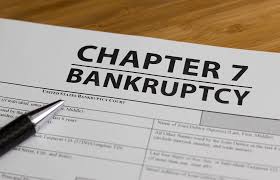Understanding the Requirement to List All Debts in Chapter 7 Bankruptcy
Filing for Chapter 7 bankruptcy is a significant step taken by individuals or businesses overwhelmed by debts and financial obligations. A crucial aspect of this filing process is the comprehensive disclosure of all debts, regardless of their status. This includes all credit accounts, even those with zero balances or credit cards that are currently active and consistently paid on time. Such thoroughness ensures fairness and legal compliance throughout the bankruptcy proceedings.
The bankruptcy law mandates that every creditor must be acknowledged in the petition. This requirement eliminates the possibility of excluding certain creditors, which would otherwise create favoritism and imbalance among debts. Equal treatment safeguards the integrity of the bankruptcy process and promotes transparent resolution of outstanding financial responsibilities.
Legal Implications of Listing Credit Cards with Zero Balances or Active Accounts
Even if a credit card shows a zero balance at the time of filing, it must be listed amongst the debts. Such zero-balance accounts still represent potential financial obligations or contractual agreements with creditors. Presenting them in the bankruptcy petition serves multiple legal purposes, such as providing creditors with knowledge of the bankruptcy status and prohibiting future claims to regain debt recovery through improper channels.
Furthermore, active credit card accounts that are regularly managed and paid according to schedule are similarly subject to listing. The bankruptcy framework recognizes the ongoing nature of these obligations and requires their inclusion to ensure comprehensive debt assessment. Failure to list these debts could be interpreted as an attempt to conceal financial information, which may invoke adverse legal consequences, including dismissal of the bankruptcy case or allegations of fraud.
Automatic Account Closures Upon Filing Chapter 7 Bankruptcy
Once a Chapter 7 bankruptcy case is officially filed, the case information is disseminated to various credit reporting agencies. Typically, credit card issuers receive notifications via the credit bureaus alerting them of the bankruptcy filing associated with the cardholder's account. In response to such notification, most credit card issuers proceed to automatically close the accounts linked to the debtor to prevent further credit utilization or financial risk.
This automatic closure of accounts generally applies to both inactive and active credit cards, aiming to freeze further charges and limit outstanding debt accumulation. For the individual filing bankruptcy, this can be a significant financial transition, especially if the credit card was used for essential purchases or served as a financial safety net. Understanding these dynamics beforehand helps debtors anticipate changes in their credit lines and plan accordingly.
Options for Retaining Credit Card Accounts Through Reaffirmation
In certain circumstances, a debtor may wish to retain the use of a specific credit card account rather than allowing its closure post-bankruptcy filing. This is achievable through a legal mechanism known as reaffirmation. Reaffirmation involves voluntarily agreeing to continue paying a debt despite the bankruptcy case, effectively reinstating the underlying obligation.
To proceed with reaffirmation, the debtor must negotiate with the credit card lender who holds the account. The lender must consent to the reaffirmation agreement, typically based on an assessment of the debtor’s financial position and the likelihood of continued payments. Subsequently, the court must also approve the reaffirmation as being in the debtor’s best interest, ensuring it does not impose undue hardship or impede financial recovery.
The reaffirmation process is a delicate legal matter requiring a comprehensive understanding of bankruptcy implications. An unadvised reaffirmation could inadvertently extend financial burdens or complicate the bankruptcy discharge, defeating the purpose of debt relief. Hence, it is essential for anyone considering reaffirmation to consult thoroughly with a qualified bankruptcy attorney who can evaluate the benefits and risks associated with reaffirming a particular credit card debt.
The Importance of Legal Guidance During Bankruptcy
Navigating the complex environment of Chapter 7 bankruptcy necessitates professional legal support. Bankruptcy laws and regulations encompass intricate requirements that, if not observed properly, can jeopardize the outcome and effectiveness of the filing. From correctly listing all debts to managing reaffirmation offers, an experienced attorney plays a crucial role in safeguarding a debtor’s rights and interests.
Legal counsel assists in preparing the bankruptcy petition comprehensively, ensuring all creditors and debts are accurately disclosed. They also provide strategic advice on which debts may qualify for reaffirmation and which should be discharged to maximize financial relief. An attorney’s expertise helps prevent mistakes that could delay the bankruptcy case or result in denial of debt discharge.
Benefits of Accurate Debt Listing in Chapter 7 Bankruptcy
Listing all debts, including those without current balances and active, timely paid credit card accounts, provides numerous benefits:
- Ensures compliance with bankruptcy laws and court requirements.
- Prevents possible accusations of hiding assets or concealing liabilities.
- Facilitates equitable treatment of all creditors in the bankruptcy proceeding.
- Provides a clear financial picture to the trustee and court for appropriate case management.
- Protects the debtor from future legal challenges based on incomplete disclosures.
Understanding the Reaffirmation Agreement Process
The reaffirmation agreement is a formal contract that re-establishes the debtor’s obligation to a specific creditor after filing for Chapter 7 bankruptcy. It must be filed with the bankruptcy court and approved by the judge. The purpose of reaffirmation is to allow debtors to retain certain assets or continue using credit lines that would otherwise be eliminated.
Before entering into a reaffirmation agreement, debtors must consider whether the continued payments align with their financial recovery plan. The agreement commits the debtor to resume payments and potentially increases financial liability. Thus, reaffirmation is typically used for secured debts or credit accounts that the debtor finds particularly valuable.
Legally, affirming a debt is voluntary, and creditors cannot force debtors to reaffirm. However, if a reaffirmation is agreed upon and approved, the debtor remains legally responsible for that debt after bankruptcy discharge. Failure to meet reaffirmed obligations might lead to repossession or other creditor actions.
When to Consider Reaffirming a Credit Card Debt
Deciding whether to reaffirm a credit card debt depends on several factors:
- Necessity of Retaining the Credit Card for Ongoing Purchases or Financial Management.
- The Interest Rates and Terms Associated with the Card Compared to Other Financing Options.
- Ability to Meet Payment Obligations Without Straining the Budget or Directly Affecting Essential Living Expenses.
- Potential Impact on Credit Score and Future Credit Opportunities.
- Legal Advice Supporting the Reaffirmation Decision as Beneficial for Long-Term Financial Health.
Potential Risks of Reaffirmation Without Proper Advice
Without thorough consultation and legal review, reaffirming a debt may lead to unintended negative consequences. These risks include:
- Extending debt obligations that could have been eliminated through bankruptcy discharge.
- Increased financial stress and hindered ability to rebuild credit.
- Possibility of default and subsequent legal actions by creditors after reaffirmation.
- Reduced flexibility in managing post-bankruptcy finances and budgeting.
How Bankruptcy Affects Your Credit Report and History
Chapter 7 bankruptcy filing is recorded on your credit report and typically remains there for up to 10 years. This negative mark can significantly affect your credit score, impacting your ability to obtain loans, credit cards, or favorable interest rates in the future. The reporting agencies update creditors about the bankruptcy status, which frequently results in account closures and revised credit limits.
While bankruptcy provides relief from overwhelming debts, the resultant credit profile alteration underlines the importance of prudent financial decisions throughout and following the bankruptcy process. Responsible management of financial obligations, including selected reaffirmations, can aid in gradually rebuilding creditworthiness.
Steps to Take After Filing Chapter 7 Bankruptcy
Following a Chapter 7 filing, several proactive measures can help rehabilitate finances and prepare for a fresh start:
- Consult regularly with your bankruptcy attorney to understand ongoing obligations and opportunities.
- Review and verify all debts listed in your bankruptcy case for accuracy.
- Evaluate any reaffirmation offers carefully with professional guidance.
- Monitor your credit report to ensure the bankruptcy status is correctly reflected and no errors are present.
- Develop a realistic budget and financial plan to rebuild credit and savings post-bankruptcy.
- Avoid incurring new unsecured debts while establishing financial stability.
How Legal Consultants in Bankruptcy Can Assist
Legal Marketplace CONSULTANT specializes in providing comprehensive legal support for individuals navigating Chapter 7 bankruptcy. Our experienced team understands the complexities of bankruptcy law and strives to guide clients through every procedural step, including debt listing and reaffirmation decisions.
Through personalized consultations, we ensure that all debts, including zero-balance and active credit card accounts, are accurately disclosed and addressed. We also facilitate discussions with creditors regarding reaffirmation where appropriate and represent clients before the court to secure approvals that serve their best financial interests.
Our commitment is to help clients achieve effective debt relief while laying the foundation for long-term financial recovery and stability. For assistance tailored to your unique circumstances, please contact us through the communication channels available in our bio or send a direct private message. Our team is ready to support you with expert advice and dedicated representation.
Chapter 7 bankruptcy demands that every debt be listed meticulously to comply with legal standards and protect the debtor’s rights. Credit cards with zero balances or those actively being paid should never be omitted to avoid complications or accusations of concealment. While most credit card accounts typically close automatically upon filing, reaffirmation offers a legal pathway to retain specific accounts if approved by the creditor and court.
However, reaffirmation should only proceed after thorough evaluation in consultation with a bankruptcy attorney to ensure that it aligns with one’s financial recovery goals and does not jeopardize the benefits of bankruptcy relief. Seeking professional guidance through organizations like Legal Marketplace CONSULTANT can provide vital support throughout this challenging process. Proper understanding and careful management pave the way to a successful financial fresh start following Chapter 7 bankruptcy.
Legal Marketplace CONSULTANT offers full-spectrum legal services specializing in bankruptcy proceedings, debt management, and financial restructuring. Our expert team consists of attorneys, legal consultants, and financial advisors committed to providing clear, personalized solutions to individuals and businesses seeking financial relief.































